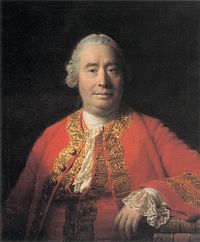David Hume (picture linked to source) was covered in an earlier post. On August 25, 1776, the great philosopher died. Hume is thought to have died of cancer. As related by James Boswell in this snippet of conversation with the incredulous Samuel Johnson (from "Life of Johnson"), Hume may not have feared his death. 'BOSWELL: When we were alone, I introduced the subject of death, and endeavoured to maintain that the fear of it might be got over. I told him that David Hume said to me, he was no more uneasy to think he should NOT BE after this life, than that he HAD NOT BEEN before he began to exist. JOHNSON. Sir, if he really thinks so, his perceptions are disturbed; he is mad: if he does not think so, he lies. He may tell you, he holds his finger in the flame of a candle, without feeling pain; would you believe him? When he dies, he at least gives up all he has.'
Walter Scott records passing Hume's grave in his Journal (January 24, 1826): '...Went to the funeral of Chevalier Yelin, the literary foreigner mentioned on 22d. How many and how various are the ways of affliction! Here is this poor man dying at a distance from home, his proud heart broken, his wife and family anxiously expecting letters, and doomed only to learn they have lost a husband and father for ever. He lies buried on the Calton Hill, near learned and scientific dust--the graves of David Hume and John Playfair being side by side.'

No comments:
Post a Comment
Note: Only a member of this blog may post a comment.